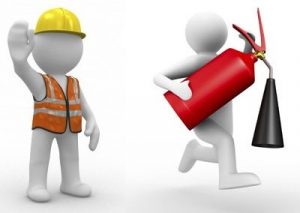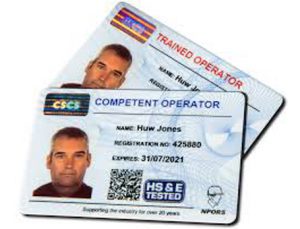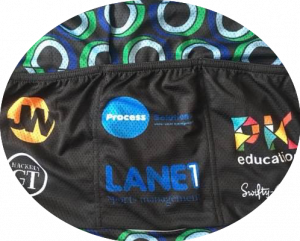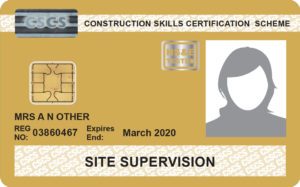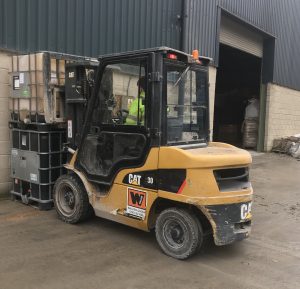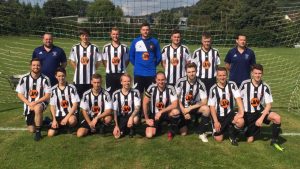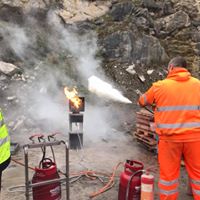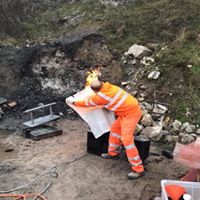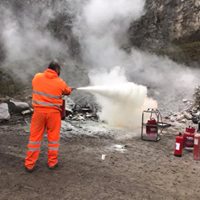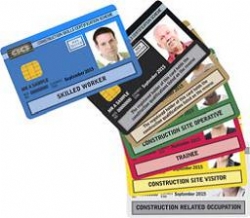Does your business have fire marshals? They can make a significant contribution to fire safety in businesses by playing a key role in protecting premises, employees and visitors. A fire marshal’s responsibilities generally fall into two categories: preventing fires and safe emergency evacuation.
Are you required to have fire marshals?
The fire marshal helps you meet your legal obligations as set out in the Regulatory Reform (Fire Safety) Order 2005 in England and Wales or the Fire (Scotland) Act 2005 and the associated Fire Safety (Scotland) Regulations 2006.
You (or the responsible person if it isn’t you) must nominate sufficient numbers of competent people within the organisation to assist with fire safety duties. These duties include fire fighting and fire detection, evacuation and providing fire safety assistance. In other words, you’re legally required to have properly trained people who can do those activities. In the majority of instances businesses will appoint fire marshals to help meet that requirement.
Fire prevention
Fire marshals are involved in reducing the chances of a fire occurring by constantly being on the lookout for fire hazards. They’ve also an important role in ensuring fire-fighting and safety equipment is properly installed, readily available and in good working order. For example, they’ll check that fire extinguisher service takes place and they are correctly located.
They make sure emergency exits are free from obstruction (in fact, they monitor housekeeping in general from a fire safety perspective) and that fire doors are in good condition and kept closed. They’re frequently involved in checking and testing emergency lighting and fire alarms as well as making sure fire signage is in good condition and appropriately located.
Fire marshals also participate in fire risk assessments and help to deliver the actions that result from them. They’ll manage paperwork and logbooks. And one of their top priorities is making sure evacuation plans are effective and clearly understood by everyone. They’ll be involved in fire drills. Because if there’s an actual fire, the fire marshal’s involvement and expertise is crucial – and in some instances life-saving.
Safe emergency evacuation
Fire marshals must be able to handle a sudden emergency situation calmly. They need to keep their head because a lot’s being asked of them.
They must quickly instruct people to leave and direct them towards the safest escape routes. They must provide assistance to anyone who needs it. Even if they’re not the one who initially raised the alarm, they may well be the one in charge of contacting the emergency services. As long as it’s safe to do so, they’re also in charge of doing a ‘sweep’ of the area (including isolated areas) to check everyone’s out.
At the same time, they must do all they can to reduce the risks from the fire like closing windows and doors to help prevent it from spreading. If they’ve been appropriately trained and can do so safely, they may be able to tackle a small fire with fire extinguishers.
Once everyone’s out, fire marshals are responsible for taking the roll call and informing the emergency services if anyone’s unaccounted for.
How many should you have?
The number you need should be identified through your fire risk assesments. It’ll depend on several factors: whether it’s a high, medium or low risk area, the size of the site, the number of floors, the number of people present in that area, any specific mobility issues that individuals may have and so forth. You’ll need to ensure you’re covered for all shifts, breaks, sickness and other forms of absence and holidays too.
Supporting your fire marshals
Fire marshals need to keep on top of a wide range of fire safety issues and constantly be on the lookout for any hazards, all in addition to their usual job. And during a fire evacuation, they must remain level-headed to keep everyone calm and safe while not putting themselves in danger.
It’s a demanding role and you can help them by making sure they’re well trained and receive regular refresher sessions. By making sure your fire marshals are fully competent and understand what their role is, you’re supporting them and protecting those around them and your business too.